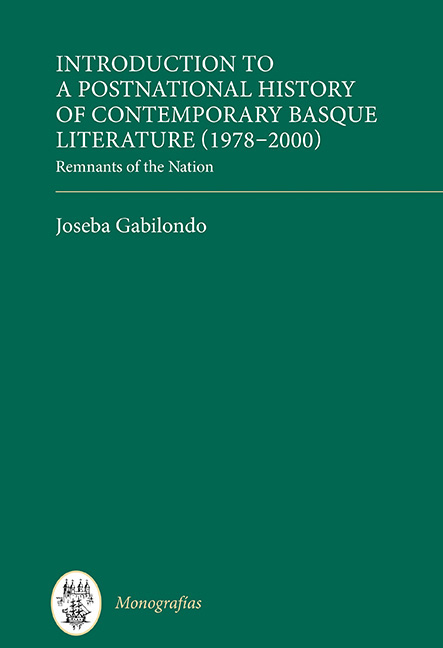 Introduction to a Postnational History of Contemporary Basque Literature (1978–2000)
Introduction to a Postnational History of Contemporary Basque Literature (1978–2000) Book contents
- Frontmatter
- Contents
- Preface and Notes on the Translation
- Acknowledgements
- I Postnational Theory and History
- 1 Postnationalism and Basque Literary History
- 2 Minor and Major Literatures: A Postnationalist Approach
- 3 From National to Postnational: A History of Twentieth–Century Basque Literature
- II Writing the Nation: On Atxaga's Ethiopia and Obabakoak (1978-92)
- III After the Nation: Hybrid Postnational Literatures (1992-2000)
- Epilogue: Basque Literatures 2001-17
- Works Cited
- Index
1 - Postnationalism and Basque Literary History
from I - Postnational Theory and History
Published online by Cambridge University Press: 06 September 2019
- Frontmatter
- Contents
- Preface and Notes on the Translation
- Acknowledgements
- I Postnational Theory and History
- 1 Postnationalism and Basque Literary History
- 2 Minor and Major Literatures: A Postnationalist Approach
- 3 From National to Postnational: A History of Twentieth–Century Basque Literature
- II Writing the Nation: On Atxaga's Ethiopia and Obabakoak (1978-92)
- III After the Nation: Hybrid Postnational Literatures (1992-2000)
- Epilogue: Basque Literatures 2001-17
- Works Cited
- Index
Summary
Jesús María Lasagabaster, by all accounts the main promoter and practitioner of Basque literary studies in the 1970s and 1980s, was at the vanguard of Basque literary criticism on the subject of postnationalism. In his book from 2002, Las literaturas de los vascos (Literatures of the Basques), he established the basis for a postnational critique of literature, even though he did not use the term ‘postnational’. In the introduction to his book, Lasagabaster advances the following proposition:
My teaching and research activity has been centered […] on Spanish and Basque literature, with a preferential attention given, in the former, […] to Basque writers who used Castilian as the language of their literary endeavor [….] From this position, it is not surprising that I have never understood, or better, I have never wanted to understand the sterile polemic that emerges – or used to – among us from time to time about what is ‘Basque literature’ and who deserves the label of ‘Basque writer’.
I agree with Lasagabaster that to establish an absolute national divide separating Basque writers who write in Basque from those who write in Spanish (or even in French and English) is not meaningful; instead, they all together form ‘Basque literatureS’.
Prior to elaborating my proposal in detail below, let me advance the definition according to which, postnational Basque literature(s) is constituted by all the literatures written by Basques in all their languages across several states in what constitutes an irreducible history of social struggle, oppression, and diglossia. In this respect, Lasagabaster's contribution represents a very fertile departure from national literary theory. This chapter is a first attempt to study what a postnational literary theory would constitute for Basque literature, in particular, and for literary theory, in general.
Most Basque literary critics – if not all – stem from the discipline of philology; they (we) were all trained to study the intimate connection that the discipline established between literary history and national language. As a result of the long genealogical thread spanning from the founder of the philological discipline, Fredric Schlegel, to his Basque counterpart, Koldo Mitxelena – the founder of modern Basque philology and also the author of the first modern history of Basque literature (Historia de la literatura vasca) – all literary historians have accepted that Basque literature is only so if written in Basque.
- Type
- Chapter
- Information
- Introduction to a Postnational History of Contemporary Basque Literature (1978–2000)Remnants of the Nation, pp. 3 - 24Publisher: Boydell & BrewerPrint publication year: 2019


